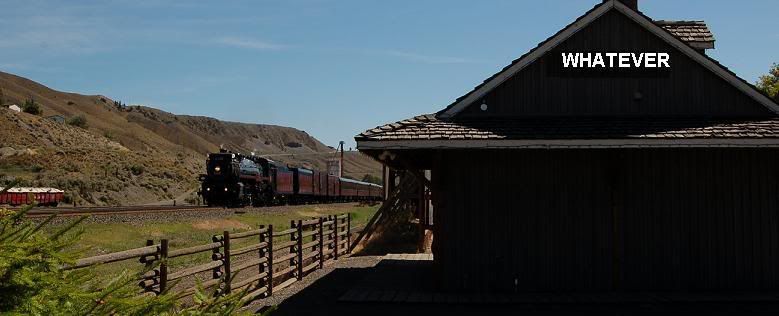// CN Rail vs Richmond
This post is open for debate! Argue with me, disagree or agree. This should be wickedly awesome
The Richmond Review
By Martin van den honestly
Back 20 years ago, when Joanne Fisher first moved into her home on No. 8 Road in East Richmond, the nearby railway line was little used and easily forgotten, lost in the lush backdrop of trees and green.
In that respect, Fisher was like her counterparts in Burkeville, who have grown accustomed to the din of airplanes soaring overhead. The odd whistle and clickety-clack of trains passing by was no bother.
But that all changed in 1992, when CN Rail began to operate its works yard in the middle of the night and escalated its operations. Short trains became longer, overnight noise routine. A couple of thunderous diesel-spewing locomotives turned into nearly a half dozen. And the odd shake turned into troublesome daily quakes. As activity ramped up in the works yard, so worsened the impact on Fisher's life.
Fisher, who has sued Canadian National Railway in B.C. Supreme Court, contacted The Richmond Review Tuesday, following Monday night's four-car derailment of a 39-car train not far from her home.
Four trains jumped the tracks on the Lulu Island trestle, one of which plunged into the North Arm of the Fraser River, carrying with it numerous brand new Toyota cars.
Fisher pointed out that this isn't the first derailment in the area, and that one on Dec. 31, 2002 happened next to her house and caused her already-split garage foundation to heave several inches. The split itself, she claims, was caused by the increased rail activity.
The cause of the 2002 derailment, according to Fisher, was speed and specifically trains being coupled together with too great a force.
Fisher's court case begins the discovery phase early next year.
Fisher said the sound of trains being shunted together each night is ruining her quality of life.
In addition, the ear-splitting 90 decibel whistle that screams four times each occasion a train reaches a level crossing now repeats itself up to 100 times on the worst of days, she said.
Trains are now a lot longer and much heavier, causing her property to routinely shudder, one time generating a jolt powerful enough to knock food off her table.
She wonders if East Richmond's soils are designed to withstand the loads that are being forced on them each day.
In 2000, Fisher met with CN's lawyer and representatives from the Canadian Transportation Agency, tasked at the time with regulating noise and rail complaints.
An agreement was reached, but Fisher said CN reneged on its commitment to cease overnight work and park the noisy locomotive in a designated area away from Fisher's home, which is near the rail yard near No. 8 and River roads.
Satisfied with the plan, Fisher agreed to withdraw her complaint. But there's been no improvement.
"CN has not kept to that agreement for one moment."
Since then, she's brought in municipal, provincial and federal politicians in an attempt to get some help.
Though they've been supportive, that hasn't resulted in anything positive for Fisher.
"So, CN has had all these different officials approach them saying 'You've got a problem here,' and they've basically thumbed their nose for 13 years.
"Delta-Richmond East MP John Cummins has written CN Rail on her behalf, and hasn't been impressed by the response.
"Lately, the traffic there has increased exponentially. I know of the problems and I sympathize with her," he said.
"CN has just brushed us off on this like we didn't matter. Their arrogance...These guys just don't give a damn," he said, likening Fisher's situation to the plight of Bridgeport residents who fought futilely with the Vancouver International Airport Authority over the noise of airplanes flying over their homes.
"The times that I've dealt with this company (CN), I just found that they don't care about what you think."
Monday's derailment has sparked calls for an inquiry by Burnaby-New Westminster MP Peter Julian, the NDP's transport critic.
"There has been a five-fold increase in the number of derailments in British Columbia in 2005 compared to 2004, including two in the past 24 hours.
"It is becoming clear that CN is engaging in dangerous practices and we are demanding an immediate public inquiry into the safety practices of CN Rail."
Graham Dallas, regional manager of communications for CN, said the impacted rail line was back in operation by Tuesday night and the rail car recovered from the Fraser and placed on a barge for inspection by federal transport authorities.
"We have to keep the traffic moving."
Asked about the complaints of Fisher, Dallas said "the line is built to handle current traffic loads."
"Unfortunately, a rail line is a 24 hour per day operation."
Dallas said rail crews have been asked to park their locomotives away from residents' homes in an effort to mitigate noise levels, and remote cameras have been installed to ensure compliance.
//Okay... So let me get this straight... This lady lives beside a rail line, and she expects peace and quiet? It's too loud? Of course it is you moron! Your living beside a rail yard! You can't just turn your engine onto silent, or stop running completely. The railway is a business that must meet its demand. Who does CN want to make happy? An angry person who is living beside the tracks, or there customers, who pay them money?
That's a tough one...
Short trains became longer, overnight noise routine. A couple of thunderous diesel-spewing locomotives turned into nearly a half dozen - Well, short trains which became longer usually need a some more locomotives. You can't increase the length of a train without adding an engine to help it out. I mean, isn't that common sence? The overnight noise... Well, again, CN is pretty busy on the railroad, and they can't just shutdown to let a few people go to sleep. Terribly sorry, but that's not how it works. The reason for all these longer trains and increased locomotives? More business in Richmond! Which means more jobs for Richmond people! There, you should be happy!
Fisher pointed out that this isn't the first derailment in the area, and that one on Dec. 31, 2002 happened next to her house and caused her already-split garage foundation to heave several inches. The split itself, she claims, was caused by the increased rail activity. - First of all, your living in Richmond, and in that area, right beside the river. May I remind you that your on nothing but a bunch of sand, and when you dig about a couple feet deep, you hit water? Especially since your living right beside the water, that can't help things. The rail traffic probably helped cause the problem, however, you move her house to a rail yard in Coquitlam, does it have the same problem? I wouldn't think so.
The cause of the 2002 derailment, according to Fisher, was speed and specifically trains being coupled together with too great a force. - According to Fisher... haha! Oh man, this one is too easy... First of all, what does she know about trains? I am assuming nothing, since nobody really knows anything about trains. The only people who do know the facts about railways are the train fans, and last time I checked, they liked railroads. Another thing, did she investigate the derailment herself? Is she an inspector who knows every little thing? Probably not! She doesn't even know how a railroad works, so she doesn't know how hard you can couple a train together or what speed CN has set out for its train crews. Seriously lady, you don't know everything, go back into your hole and watch little house in the prairie some more.
In addition, the ear-splitting 90 decibel whistle that screams four times each occasion a train reaches a level crossing now repeats itself up to 100 times on the worst of days, she said. - You know what, she has a point here. I think that trains should just stop blowing their whistles at crossings, even though a train could hit a car or person and overall just make the situation very dangerous for other people, just so this person can be happy! Because of course, it's all about her!
Trains are now a lot longer and much heavier, causing her property to routinely shudder, one time generating a jolt powerful enough to knock food off her table. - Honestly, no sarcasms or anything here, this is a true statement. Richmond lives on a spunge, and I've read many articles on CN's Richmond line. They have restricted speeds because the tracks are on such a spungy ground, and I've seen trains on those tracks, they literally sink into the ground. It isn't dangerous or anything, because if it was, they wouldn't be running trains on the line. It's not like CN wants to derail their trains or anything. So all I can say about this line is that your living in Richmond... You can't change the fact that you live on a spunge
She wonders if East Richmond's soils are designed to withstand the loads that are being forced on them each day. - Well... Lets see, they run trains on them every day, they have had that one derailment on 2002, and the derailment this week was on a bridge, made of wood, not soil. So what, 2 derailments in about 50 years? I think there doing okay.
"It is becoming clear that CN is engaging in dangerous practices and we are demanding an immediate public inquiry into the safety practices of CN Rail." - If any of you have been keeping up with current events, then you would know that this statement is true, I don't deny it. However, the problems have been directed at their new BC Rail line, not Richmond, or anywhere near it.
"Unfortunately, a rail line is a 24 hour per day operation." - ...And there's nothing you can do about it.








1 Comments:
In June 2007, the federal government passed Bill C-11, which contains provisions to regulate rail noise and vibration problems, as communities across the country have been experiencing in much the same way as described here. The feds heard a litany of horror stories from people similarly affected as Fisher. The problem detailed here is in no way isolated, and is, in fact, an issue in many communities in the lower mainland, with the situation finally requiring regulation. One angry person? I think not. Check your facts first, bud.
The feds wouldn't have stepped in to regulate this if it wasn't a widespread problem.
Post a Comment
<< Home